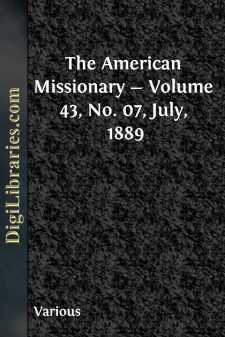Categories
- Antiques & Collectibles 13
- Architecture 36
- Art 48
- Bibles 22
- Biography & Autobiography 813
- Body, Mind & Spirit 142
- Business & Economics 28
- Children's Books 14
- Children's Fiction 11
- Computers 4
- Cooking 94
- Crafts & Hobbies 4
- Drama 346
- Education 46
- Family & Relationships 57
- Fiction 11829
- Games 19
- Gardening 17
- Health & Fitness 34
- History 1377
- House & Home 1
- Humor 147
- Juvenile Fiction 1873
- Juvenile Nonfiction 202
- Language Arts & Disciplines 88
- Law 16
- Literary Collections 686
- Literary Criticism 179
- Mathematics 13
- Medical 41
- Music 40
- Nature 179
- Non-Classifiable 1768
- Performing Arts 7
- Periodicals 1453
- Philosophy 64
- Photography 2
- Poetry 896
- Political Science 203
- Psychology 42
- Reference 154
- Religion 513
- Science 126
- Self-Help 84
- Social Science 81
- Sports & Recreation 34
- Study Aids 3
- Technology & Engineering 59
- Transportation 23
- Travel 463
- True Crime 29
The American Missionary - Volume 43, No. 07, July, 1889
by: Various
Categories:
Description:
Excerpt
FINANCIAL.
The Figures Improving.
The receipts of the Association for the eight months to May 31, 1889, are: from donations, $134,993.37; from estates, $26,530.09; income, $6,479.21; tuition, $26,084.21; U.S. Gov't, $9,540.87, total, $203,627.75. Expenditures for the eight months, $229,422.82. Debtor balance, $25,795.07.
The debtor balance reported in the last MISSIONARY for the seven months ending April 30th, was $28,328.14. The showing, therefore, is favorable, and we appeal to our friends to make their contributions so generous that at the end of the fiscal year we may report entire freedom from debt.
At the recent meeting of the American Home Missionary Society, held in Saratoga (June 6th), the question of the future relations of the newly formed Congregational Conference of Georgia to that Society, and to the earlier Congregational Association of that State, was fully discussed, and resulted in the following action:
In the full conviction that these churches are in accord with the principles of Congregationalism, and with the principles of this Society, and with those held by the Congregational churches which it represents:
Resolved. That we heartily welcome them to fellowship with us in the Gospel. We commend them to the fraternal sympathy and prayers of all our people, and we request the officers of the society to extend to them such financial aid as they may need as promptly as the state of its treasury will allow.
Resolved. That this Society rejoices to learn that an effort is making to unite the Georgia Congregational Conference and the Georgia Congregational Association on principles of equal recognition and fellowship of all the churches of each body, and trust that such a union will be accomplished.
We are in full and hearty agreement with the general spirit of these utterances. In the hope that the churches of the Georgia Conference are in accord with the principles of Congregationalism, which do not discriminate against men because of caste or color, we are prepared to welcome them heartily. That Conference has already published its Articles of Faith and of Church Government, and these have assured us of its adherence to the general principles of the Congregational faith and order. The only question still open is as to the readiness of that body to unite with the Congregational churches already existing in that State in the practical recognition of the broad Christian and Congregational principles in the fellowship of all churches irrespective of caste distinctions.
The second resolution quoted above rejoices in the effort now making to unite the two Congregational bodies in Georgia on that basis. We trust that effort may be successful, for we believe that such a union is essential to recognition by the National Council and to the cordial fellowship of the Congregational churches. The Georgia Association, ever since its organization in 1878, has been recognized and represented in every subsequent meeting of the National Council, and we cannot see how the Council can consistently welcome another organization, covering the same State, that is kept separate from the older body by the line of race or color; nor do we believe that the Congregational churches of this country will fellowship both organizations thus held apart. We are confirmed in the correctness of this impression from the decided and independent utterances of the influential religious papers which so largely represent the sentiments of the Congregational churches of this country.
We present below some extracts from such of these papers published since the Saratoga meeting as have come to hand before the MISSIONARY goes to press, while in another portion of our pages we give more at length the prior utterances of these journals on the same general subject....












